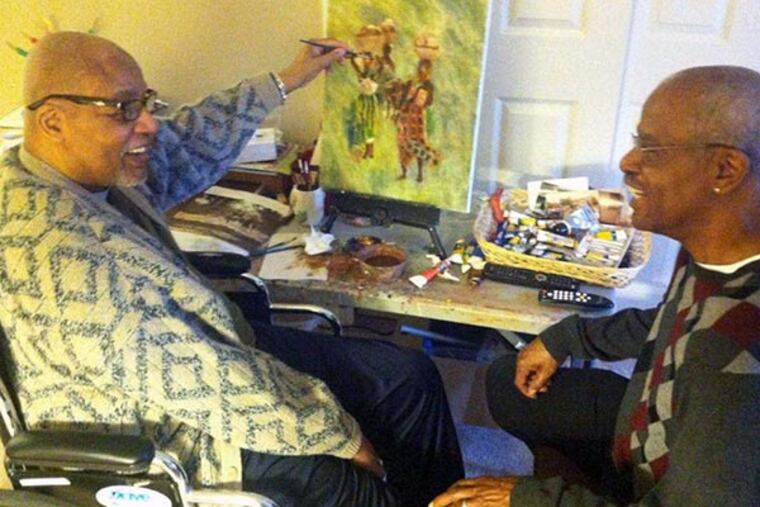Stroke can't still his paintbrush
DEPTFORD A stroke stole Horace Broughton's speech and cost the painter the use of his right hand several years ago.

DEPTFORD A stroke stole Horace Broughton's speech and cost the painter the use of his right hand several years ago.
More recently, the Deptford resident, 70, lost his life partner, his sister-in-law, and his mother.
But Broughton still has his younger brother and only sibling, Robert. And the artist, whose motto is "Never Give Up," also taught himself to use his left hand to paint again.
"This is his studio," Robert, 69, says, welcoming me into his brother's tidy apartment at Sterling House, an assisted-living facility.
A wheelchair-level tabletop holds a work in progress on an easel, as well as a clutter of paint tubes and plastic tubs for soaking brushes. Jazz CDs are stacked nearby, and his paintings, pencil sketches, and a sensational woodcut ("Tropic in Blue") enliven the walls.
"Hi," says Horace, an animated fellow whose lustrous smile needs no translation, but whose conversation I find hard to follow. ("He speaks through his art," notes Veronica Nelson, resident care coordinator at Sterling.)
Robert can understand many of Horace's utterances, and no wonder: The two brothers, who grew up in the Germantown section of Philadelphia, are so close that they enlisted and served in the Navy together in the 1960s.
They eventually went to work for Gloucester County - Horace as a staff member in the Prosecutor's Office and Robert as a community development planner.
"Our mother, Mary, did calligraphy," says Robert, a Glassboro resident. "Our father was a burner at Sun Ship in Chester and a self-taught artist. He taught my brother how to paint."
Horace Sr. settled in Somerdale; a 1986 Inquirer story about his one-man show at Camden County's Hopkins House Gallery described how the artist switched from watercolors to oils after multiple heart attacks.
"Like father, like son, I guess," says Robert, adding that the two had a joint show about 30 years ago at the Walt Whitman Cultural Arts Center in Camden.
The younger Horace's work, which often features musical or African themes, has been shown in Philadelphia galleries and at the city's African American Museum. He is also well known locally for playing in a traditional African drum ensemble.
And before the stroke, Horace made presentations about African culture at local schools, says Barbara Carter, the victim advocate in the Prosecutor's Office.
"We just miss him so much," says Carter, who describes Horace's return to making art as nothing short of a miracle.
"To be able to paint again after [a stroke] like that is pretty amazing," says physical therapist Chad Durboraw, who works for Sterling's parent company, Brookdale Senior Living.
Sanjay Kansupada, regional executive director of Brookdale Senior Living, praises Horace's spirit.
"He has a very positive quality," Kansupada says.
The same quality is visible in the artist's canvases, which shimmer with color and movement.
"A year after the stroke, he was trying something," Robert says.
His brother began using a pencil with his left hand; the physical therapist at the time "couldn't believe it," Robert adds.
"I can remember looking at his work when he started, and I've seen it grow. All of a sudden, he started using oils again."
"I had nothing else to do," Horace says, clearly, and the two brothers laugh.
"When this [the stroke] first happened, they didn't think he'd make it," Robert adds. "I worried about him so much.
"But when I see him pick up a brush, I don't worry. I know that he's OK."